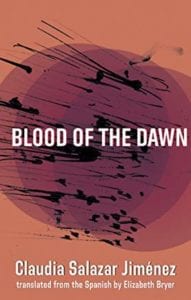
A strong, intense debut novel examining the lives of three women during a time of heinous political violence in Peru.
Shelf Unbound: Blood of the Dawn goes back to the 1980s when the extreme left terrorist group the Shining Path brutally tortured and killed thousands of Peruvians, many of them villagers, in what is now referred to as “the time of fear.” You were a child during this period; why did you choose to write about it?
Claudia Salazar Jiménez: That time marked my entire generation and we are still living with its consequences today. There are several novels and short stories about it, but almost all of them are narrated from a male-centered perspective, as usually happens in the Peruvian literary tradition. I chose to write about this time in order to think about and try to understand how we—as a nation—allowed such brutal violence to happen. I also chose to write it from a different perspective: one that includes the voices of women. It is a perspective that transcends the specifics of this historical moment and crosses époques and geographies. I wanted to write about violence against women and their struggle for survival. It is important that we, as a society, remember this period, its causes and consequences.
Shelf Unbound: Your novel is told from the perspectives of three women—a journalist intent on photographing the atrocities, a member of the Shining Path, a villager who gets caught up in the conflict. What were you able to shed light on by having female narrators that you might not have been able to with male narrators?
Jiménez: Having female narrators and characters allows me to include a perspective that is usually not taken into account when War is told. Voices of women tend to be silenced or obliterated during the narration of history. In order to include these voices, it is necessary to consider the kind of language and grammar we are going to use. Language shapes our reality, so, as a writer I decided to break the grammar that sustains the patriarchal violence and to create a new one that avoids the reproduction of this violence and questions its origins. I wanted to use a discourse that not only represented violence but that incarnated the female bodies and sexualities.
Shelf Unbound: The violence against the women in this novel is gut-wrenching. Three times, with three different women, you begin a description of the horrific beatings and rapes with the simple line: “She was a lump on the floor.” Those words are a poignant and perfect way of expressing how they have been completely dehumanized. I imagine these sections would have been quite hard to write. How did you go about writing them?
Jiménez: Those scenes are the foundation of the novel; they appeared in the first draft. It was difficult, indeed. Sometimes, I had to stop writing for a couple of days in order to keep my own sanity. Writing about violence is not an easy process to endure, but it has to be done. We cannot relegate these stories to silence. I believe that literature allows us to approach this period under a different light.
Shelf Unbound: Your writing is beautiful and poetic. I particularly found the lesbian sex scenes to be gorgeous and evocative. Why did you choose to make the character of the journalist Melanie a lesbian?
Jiménez: Considering the centrality of sexual and power relations in Blood of the Dawn, I wanted my novel to include several diverse approaches to desire and sexual relations. As I mentioned before, sexuality is a key point in Blood of the Dawn. Including a character whose sexuality is fluid allowed me to include a subjectivity often obliterated in the Peruvian (and Latin American) literary production, another perspective that focused on female sexual desire and agency.
Shelf Unbound: What would the climate for gays and lesbians have been like in the time period of your novel, and what is it like today?
Jiménez: The climate for gays and lesbians in Peru is pretty harsh. Peru is a very traditional country where Catholic religion still infuses the State and its laws. The climate is not much different from how it was during the 1980s (the period of the novel).
Shelf Unbound: What do you want American readers to take away or learn from reading this novel?
Jiménez: The importance of thinking about our historical processes of violence and terrorism, and to reflect on the violence against women.
